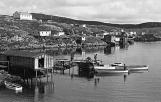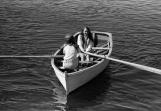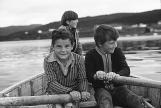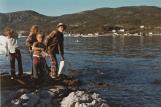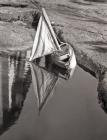1
All the communities in the northern part of the island of Newfoundland border the water, either an open harbour or a bay. In both summer and winter, children could be found using the water as part of their play area. At the same time they played in and around the water, few knew how to swim, and anyway the water is very cold, even is summer so that swimming in the ocean was not a real part of their play. Some who knew how to swim would more often walk to an inland pond to spash around, swim and fish for trout. With a long history of accidental drownings, being lost at sea, shipwrecks, and falling through the ice, it was only natural for parents to be wary of letting their children hang out on wharves or fool around in boats. Of course, warnings by adults did not stop children from having adventures around and on the water in all seasons. There were some parents who felt that letting their children use rowboats and be down on the wharves was good practice for their future as adults living in seaside towns.3
We spent a lot of time on the wharf. The adults always watched out for us and you knew everyone but a lot of the older people would yell at you to get up off the wharf. My brother Ross almost drowned. I was supposed to be watching him when he went outside. He went missing and I started to look for him. My older sister had a doll with a red pair of pants. When I went out to look for Ross, I saw what I figured was her doll with the red pair of pants on out in the water. So I came in and I told mother, I can't find him. I went out again and saw it was Ross in the water. He fell off the landing and hit his head on a rock. He was unconscious in the water. Mother went out so far and she got ahold of him and carried him in. My grandmother tried to get his mouth open with a spoon. My father got his finger in his mouth to try to pry it open and almost go it bitten off. Finally grandmother put her mouth over his nose and mouth and started sucking. She pulled him back to life.Len Clark - Grandois
5
It was normal for us to go out and get in a rowboat. We spent our time around the wharf and, of course, my father had boats all of my growing up. In the summertime we would go to Devil's Cove across the bay or go up to the "tickles" near Roddickton. Or we would just have fun around the shoreline.Helga Gillard - Englee
Father used to have a little rowboat down on the beach and I took that. I wasn't very old. I'd take that and row across to the other side of the harbour and row around the harbour. Yes, by myself. No fear. I can't swim. I have a fear of the water, fear of swimming pools. But salt water? I have no fear.
Margaret Byrne - Conche
8
We did what we call copying on ice pans. We also called it tally dance. We'd jump from pan to pan and, of course, sometimes fall in. The smaller the pan, the faster you had to move so you'd go from probably a large pan to this little intermediate pan, jump on that one and then jump on a larger pan. We didn't jump on too many small pans because you needed momentum to keep going. In order to have the momentum, you had to have a solid base to jump from. But then if you stepped on a smaller one, it might start sinking so you'd jump to the next big one.Con Coates - Main Brook
I remember the last t ime we we did that, Gerald got on a pan and drifted half way across the harbour over in Stage Cove. His father had to shove out his punt and go get him. Talk about scary; half the harbour was out watching.
Edmund Hunt - Conche
We were never very far out. You would fill up your boots with water but you would not drown. Actually, there were times I hoped I would drown because that would get me more sympathy than the smack on the arse for getting my boots filled with water.
Donna Byrne Hearn - Conche
12
We'd go down to the beach and put our little boats out i n the water. And the wind would take them or carry them around the shore. We would load them down with rocks, make believe it was fish. We's spend hours at that!Fred Cassell - Bide Arm
